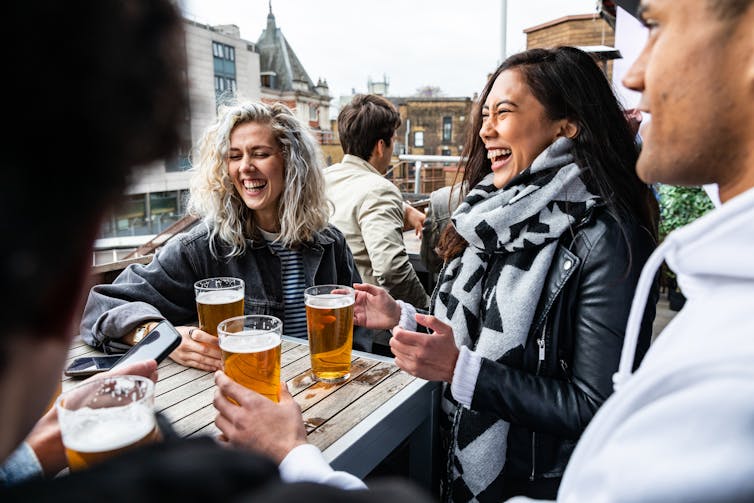
With Christmas just a month away, the good news is that COVID cases in the UK have been falling, and are now at the lowest we’ve seen them for some time.
Meanwhile, the number of new flu infections remains stable. And people in their 20s and 30s have some of the lowest case numbers of both viruses – great if you’re planning your work Christmas party or just fancy getting together with your friends this festive season.
However, while flu rates are relatively stable, they are higher than they have been for the past few years, and data from Australia suggests the UK could face an earlier and more severe flu season this year. Plus, last year, COVID cases increased 139% in the two weeks leading up to Christmas.

This article is part of Quarter Life, a series about issues affecting those of us in our twenties and thirties. From the challenges of beginning a career and taking care of our mental health, to the excitement of starting a family, adopting a pet or just making friends as an adult. The articles in this series explore the questions and bring answers as we navigate this turbulent period of life.
You may be interested in:
How to disagree without making enemies in the age of the pandemic – tips from a psychologist
Five reasons why young people should get a COVID booster vaccine
Four reasons the shift to hybrid working is set to stay for young professionals
Add in the fact that it looks unlikely that your past COVID infections or vaccinations will offer much protection against new omicron variants, and the Christmas sparkle is slightly dimmed.
But if you’re wanting to celebrate after two years of curtailed festivities, don’t despair. There are a few things you can do to minimise the risk of COVID or flu ruining your Christmas party.
1. Location, location, location
Thinking carefully about the location of your Christmas celebration can really help prevent the spread of influenza and COVID viruses. Both flu and COVID are spread by small liquid droplets when we breathe, speak, cough and sneeze.
Somewhere outdoors like an open-air ice rink or rooftop bar is the perfect choice. A preprint (a study not yet peer-reviewed) based on contact tracing data found that the odds of transmitting COVID in a closed environment were 18.7 times greater compared with an open-air environment.
Large infection events or “superspreader” events happen most often in venues that are more densely occupied and where people spend a longer time. On a smaller scale, COVID infections have been found to develop in distinct clusters in crowded indoor spaces. So it might be worth rethinking if you were going to hold your Christmas party in a “cozy” basement bar and instead brave the winter chill outside.
2. The guest list
Limiting the number of people who could meet was of course used as a way to limit the spread of COVID earlier in the pandemic. Even though these rules are no longer in place, it’s worth thinking twice about inviting the whole company to a single event. Instead, you might be able to hold a series of smaller events, for example by splitting into different departments.
On average, each person who contracts COVID will pass it on to between two and three others. But that neat country or global level estimate, known as the reproduction number (R0), hides huge variation at the individual level. In reality, most COVID infections stem from just a handful of people. Infection analysis estimates that around 15% of cases cause 80% of secondary infections.
The reproduction number of seasonal flu varies, but on average one person with the flu will pass it on to one or two others. Flu is generally more uniform in its spread, meaning the R0 number is more representative. A highly infectious person with COVID is estimated to expel hundreds to thousands of infectious virus particles per minute while talking, singing or coughing. People with flu expel the virus at lower rates.

William Perugini/Shutterstock
3. Get vaccinated
A recent preprint suggests two of the newer COVID variants, BQ.1 and XBB, have mutations which make them very good at evading the immune system. This means that protection gained from previous vaccines and natural infections might not be as effective as against earlier variants of the virus. Precisely how these variants will respond to our existing immunity is unknown though, and the NHS has offered 26 million people in more vulnerable groups across England an autumn booster this year.
Also consider a flu vaccine, which can reduce the severity of illness or even stop you you from becoming ill. Flu vaccines are readily available in the UK at GPs and pharmacies, and cost between £12 and £15 if you’re not eligible for a free one. Many workplaces will reimburse you for this cost.
Read more:
XBB and BQ.1: what we know about these two omicron 'cousins'
4. Avoid karaoke
What’s planned for the office Christmas party? A simple meal and a few drinks? Or is something a bit more interesting on the agenda? It seems that Christmas parties with activities (like escape rooms) and themes (such as casino) are on the rise.
When it comes to having a COVID-safe Christmas party, I’m afraid karaoke is on the naughty list. One study found that we produce higher rates of aerosols (tiny particles which can contain infectious virus) during singing compared with breathing and speaking. And anecdotally, singing has been linked to a few superspreader events. So maybe pick something else this year.
Post a Comment